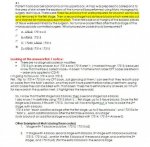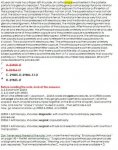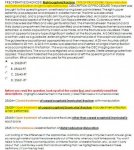2 questions:
1. Do you make it all the way through the test, or are you rushing through some at the end? And
2. Do you get intimidated by the really long operative note questions?
(If you answered 'no', then none of the following will be very helpful to you...but, my guess is that at least one of those is a yes)
Time management is a common pitfall that people encounter. They get freaked out by the sight of really long questions (or get bogged down reading them), and either put them off until the end, or struggle to understand what they're reading until they run out of time. Or, they spend entirely too much time on questions that look easy, and aren't. (If all of the code descriptions start to run together and sound the same, you have entered the 'psych-out zone'

)
This advice won't help you become a better coder, but if you want to pass the test, try to do the following:
(*Remember this very important note: Short questions are not always easy, and Long questions are not always hard - in fact, most of the time, it's the other way around.
Never judge a question by its length!*)
When you start the test, skim through every question, and pick out the ones that you can see the answer to immediately (Like medical terminology, insurance/HIPAA questions, and stuff like that) – I'm talking about the really,
really simple ones you don't even have to open your book to answer.
After you've done that, you should give
every question a
shot – start at the front of the test, and work your way to the back.
If you try to look up an answer, and it takes more than a minute or two for you to feel confident about picking one, make a note of what you think it is (or isn't), put a star on it, and move on. (A kitchen timer is really helpful for that) I realize it's hard to 'give up' when you're frustrated (and
SO close to getting the answer!), but you have to force yourself to come back to it later.
• Don't view it as ‘giving up' on the question – you're just ‘taking a break' from it.
• Or, look at it as ‘I've already missed this one'…This sounds harsh, but the reality of the matter is: if you're having a hard time making a confident decision, you're probably going to end up missing it anyways (some of the questions seriously are
just really hard - but there aren't a lot like that – they're randomly scattered throughout the test.)
• Don't waste valuable time that you could be using to answer 5-10 other questions right, trying to answer one you might end up missing anyways; you can always come back to it and give it another shot after you've answered everything else.
I can't stress this enough (especially for the CPT questions like the ones attached):
DO NOT READ THE QUESTION UNTIL YOU'VE CHECKED OUT ALL OF THE ANSWERS FIRST!!!
I know that's counter-intuitive –
you're hard-wired to read the questions first, from years of taking tests in school - going all the way back to grade school…(Remember standardized reading tests?)
Trust me on this: you really have to make a conscious effort to NOT do that. Here's why (I learned this from my own experiences):
1. You'll waste a ton of time reading irrelevant filler that's put in there, just to screw with you.
2. All of the jargon (especially on the surgeries) is overwhelming, and you'll get hung up on words that don't matter.
3. Many of the questions can be answered without reading the note at all (I've given examples on the stuff I attached) – reading the note makes it harder than it needs to be.
With CPT coding in particular, your goal is to answer questions through
the process of elimination, by looking for the similarities and differences between the choices, and then looking for keywords in the question to narrow down your choices, or pick the right answer.
I gave a couple of examples to show how easy these questions can be, if you look at them the right way. At the end of the day, it's a multiple-choice test, and all muliple-choice tests boil down to having good test-taking skills (and not so much really knowing the material, although it
definitely helps...).
(In case you're wondering, I made this for the co-workers I'm tutoring - today, actually - I don't usually just have this stuff handy waiting for someone to need it

)


